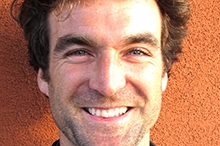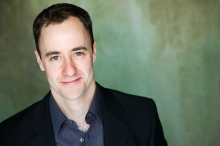Champions of Change Blog
Finding Home Turf
Posted by on June 26, 2015 at 12:31 PM EST
Ben Gucciardi is being honored as a White House Champion of Change for World Refugees.
As youth face the difficult realities of building a new life in the United States, the Soccer Without Borders (SWB) program I founded is a space they feel safe and respected. For many, the concept of classroom learning is foreign. But the sport of soccer, and the basic concept of play, provides a familiar platform for healthy learning and growth. Youth from different backgrounds find common ground on the soccer field and build cross-cultural relationships. The development of this social support system simultaneously empowers individuals and strengthens the community.
In my work with SWB, I have the opportunity to work with refugees like Take Hel Say, who arrived in Oakland, California at the age of fifteen speaking no English, having grown up in a refugee camp in Thailand. Originally from Burma, her family had fled civil war and persecution of her Karen ethnic group. When she stepped on to the field, something sparked in her: though she lacked soccer skills, she felt immediately comfortable, engaged and grateful for an opportunity to simply play. She invited friends to come along, and became a leader within her Karen and school communities. Now, five years later, Hel Say has graduated high school, is attending community college, and has joined Soccer Without Borders as a part-time coach for younger girls.
We are proud of the work we have done at Soccer Without Borders, but perhaps most proud that we have reached a point in the organization that young people like Hel Say are assuming formal leadership roles, and teaching us how to best serve newcomer communities.
Ben Gucciardi is the founder of Soccer Without Borders. He has a Master’s degree in Global Educational Leadership from Lehigh University.
Learn more about ImmigrationNominate a White House Champion of Change for Disability Advocacy Across Generations
Posted by on June 8, 2015 at 10:32 AM ESTThis year marks the 25th anniversary of the Americans with Disabilities Act, a landmark civil rights law that promises equal access and equal opportunity -- regardless of ability. It secures each person's right to an independent life, and it enables our country and our economy to benefit from the talents and contributions of all Americans. The ADA’s legacy can be seen everywhere, whether you’re using a curb cut as you cross the street, using a sign language to catch every lyric at a concert, or receiving reasonable accommodations to do your most efficient work possible. While the Federal government has led many efforts to implement the ADA to the fullest extent possible, much of the success of the ADA is due to the persistence of long-time state and local disability advocates who have advanced inclusion in their communities.
Learn more about DisabilitiesFaith Leaders as Climate Champions of Change
Posted by on June 3, 2015 at 5:00 PM ESTIn June 2013, President Obama outlined the Climate Action Plan -- his roadmap for action in the second term that cuts carbon pollution, helps prepare our country for the impacts of climate change, and continues to lead international efforts to address global climate change. President Obama believes in the power of individuals to make a difference on these issues. He also knows the faith community has a powerful role in leading climate change efforts.
As the President has said:
Let’s do more to promote … development … from ending extreme poverty to saving lives, from HIV/AIDS to combating climate change so that we can preserve God’s incredible creation. On all these issues, faith leaders and faith organizations here in the United States and around the world are incredible partners, and we're grateful to them.
This July, the White House will honor faith leaders who are making a difference to combat climate change and advance conservation in their communities. We will celebrate the impact they are having here at home, and on the lives of people around the world.
Learn more about Energy and Environment,Foster Care is Community – Everyone Can Be a Champion
Posted by on May 20, 2015 at 3:20 PM EST
Nicole Dobbins is being honored as a Champion of Change for Foster Youth
The great Muhammad Ali said, “Champions aren´t made in gyms. Champions are made from something they have deep inside them – a desire, a dream, a vision.”
Reflecting on becoming an advocate for children and families, I’m reminded of my childhood. Growing up was chaotic, filled with instability, abuse, poverty, and a parent with long-term substance abuse challenges. I longed for a healthy family. I hoped my family would get the help they needed and life would become less stressful.
In elementary school I grew aware of the importance of education and I knew I didn’t want to grow up and struggle the way my mother did. Having never finished high school, she stressed the importance of education, but for me it didn’t feel attainable. Even when I was young, I was aware of my family circumstances and the cost of college felt insurmountable.
In 5th grade my elementary school principal changed this belief. In an assembly, she told my graduating class that all of us could make it to college if we did just three things: got “C” letter grades or better, didn’t do drugs, and didn’t get pregnant. She also said she would help us pay for it through a scholarship fund. My world shifted; I now had hope for a better future.
With this, I made it to college, but not before abruptly exiting the foster care system. I “aged-out” of foster care just one day after graduating from high school. My saving grace was that I was already accepted to Oregon State University. I had three months of summer to survive before I had stable housing in the dorms.
In college, I felt lost and alone. Various people helped me along the way, but there was something missing. I was navigating a challenging transition to adulthood, which included managing and healing from past trauma. I masked my emotions on the outside well, but secretly contemplated suicide often. I seriously lacked a support system.
In my junior year, a case-worker I came to know after foster care encouraged me to apply for an internship. It was one of the first times I felt someone believed in me. I interned and later worked for FosterClub, an amazing organization. It was an opportunity that gave me purpose in life. Discovering other young people who had experienced similar circumstances gave me passion to create change. I learned how to build what was missing, my supportive network.
The following year I became the director of the internship, and was responsible for training former foster youth to become young leaders, using their experiences to improve the lives of our peers.
All children need champions. Because of instability in care, my peers often lack an anchor. They lack consistent people in their lives to guide them, hold them accountable and love them beyond their mistakes. From a young age, my desire was to change my family’s trajectory. Today, my vision is clear: I have a dream that no more young people will “age-out” of foster care without committed people who love and support them in their transition to adulthood. With more than 100,000 children waiting to be adopted and nearly 23,000 youth who age-out of foster care annually, often to poor outcomes, we have work to do.
Maybe you can’t adopt or foster, but what about mentoring, volunteering, or even making donations to your local community organizations? There are so many opportunities to become champions for children in foster care.
Nicole is the Executive Director of Voice for Adoption. She is a graduate of Oregon State University.
The Child Welfare Industrial Complex needs a “Pink Ribbon”
Posted by on May 20, 2015 at 3:09 PM EST
David Ambroz is being honored as a Champion of Change for Foster Care
As a former foster youth, having spent more than a decade in and out of care, I have lived through the best intentions of institutions in multiple states. The Child Welfare Industrial Complex (CWIC), made up of the myriad of actors in the life of a dependent child, acts to perpetrate the agency’s particular interest. Often, this coincides with the best interest of a child, but not always. For example, in the name of privacy, there was often a slow transfer of educational documents, preventing my timely enrollment. While serving a valid privacy interest, this is a lack of common sense in the youth's interests – and education is the victim. Actors remain in their silo, serving their agency goals, but doing so inadvertently causes the youth to suffer. Structural reform requires collaboration between all parts of society, and especially public engagement. Public engagement can translate into political attention, power and resources that can change outcomes. Yet the public only hears from (or about) the CWIC during times of tragedy, leading to benign neglect or short bursts of brutal attention. Achieving fundamentally different outcomes, requires all parties to work together in telling the full story about Foster Care.
In order to effect structural change in Child Welfare, the CWIC must convene as a larger societal ‘movement.’ FosterMore, is an effort in that direction. Between what works, evidence based practice, and sustained implementation, is a gulf – a gulf made up of a lack of public awareness and engagement. Instead of speaking to the vast majority of Americans, the CWIC uses terms and language that disenfranchises the public. Forming a partnership with the public, private groups, foundation and government – FosterMore came together to bridge that gap – engage the public, and therefore their elected leaders. In much the same way as the environmental, women's cancer, and other movements have come together; FosterMore is a brazen attempt to recruit Americans to join a movement to understand and end the inherited poverty of foster care.
Much as “Race for the Cure,” represented by the pink ribbon, seeks to orient our passion and attention around curing women’s cancers; FosterMore seeks to have “Education” as the north star, a rallying point to do right by our children. Education is the communication of knowledge and culture, from one to another. Education can be communicated passively, through the culture or more succinctly, through formalized settings. The remarkable nature of this knowledge is its ability to act as a key to unlock potential. At times, one aspect of education is valued over the other – yet both are vital to thrive. Foster youth have "graduate degrees" in resiliency, but have their progress in education impeded by circumstance. The cumulative effect of this is to lock foster youth into a cycle of inherited poverty.
Educational access can be the bridge out of this cycle – but extra care must be taken to empower this last generation of educationally impoverished; and that requires an army, a movement that must include the general public. Working together, FosterMore has raised awareness, chipped away at ignorance, prejudice and indifference to shine a light on the amazing potential of foster youth and families. FosterMore has created an “American Indian College Fund-equivalent,” a national scholarship for foster youth, to underpin all of our efforts in public engagement. The Scholarship will help the public think of our foster youth differently, but just as the Pink Ribbon is a symbol, it will be a gateway that allows the public to be part of the solution.
The work of the movement will not end, as every other movement has taught us. Yet, the movement must start – and FosterMore is that start.
David Ambroz is the Executive Director of Corporate Citizenship & Social Responsibility for Disney | ABC Television Group and in that role created FosterMore. He is a graduate of Vassar College and the University of California, Los Angeles School of Law.
Looking Beyond the Statistics and Finding Hope for Youth in Care
Posted by on May 20, 2015 at 2:51 PM EST
Briana Osbourne is being honored as a Champion of Change for Foster Youth
Over 400,000 foster youth are in foster care across the United States of America, and each year over 23,000 young adults will emancipate or age out of the system and enter the world of adulthood. Statistics show that out of those who age out, one in four will become involved in the justice system within two years, more than 1 in 5 will become homeless after age 18, only 58 percent will graduate high school by age 19 (compared to 87 of all 19 year olds), and fewer than three percent will earn a college degree by age 25 (compared to 28 percent of all 25 year olds). Although many of us have dreams of pursuing higher education after exiting care, many more fall victim to homelessness, unemployment, and incarceration.
Some may consider this information unimportant when considering that current and former foster youth, like myself, make up a relatively small percentage of the general population. However, while we may be few in numbers, many of us experience more traumatic incidents involving abuse, neglect and exploitation before the age of 18, than many adults will face in a lifetime. Foster youth matter because many of us can be found in the faces of your classmates, colleagues, friends and even your family members. We are filled with untapped potential and hold the keys to the success of our communities and our nation.
Fundamentally, there is no difference between my educational journey and the countless youth in care that fall victim to those daunting statistics. As children, we held the same dreams, aspirations and many of us even shared the same classrooms. Conversely, I found solace in seeing those who share my experiences obtain success. I found mentors in individuals like my Court Appointed Special Advocate, foster mother and the numerous others that helped cultivate and encourage me to pursue my seemingly impossible dreams. Their assistance, coupled with the resources I was able to access, such as college-geared workshops, field trips and educational programs planted in me the seed that educational success was truly within reach.
I firmly believe that there is hope for many other youth in care, not just because of my own success, but because of the other foster youth I’ve seen defy the odds as well. There is a great need for more mentors, advocates and supporters of the groundbreaking innovations that are making headway in the child welfare system. There is a need for youth to be encouraged to voice their opinions and for their voices to be amplified. There is a need for more youth to be told that their lives matter, that their past doesn’t determine their future and that they too can be champions for future generations to come. There is also a need for more funding and educational programming that will allow our foster youth to obtain the knowledge they need to succeed. I am calling for more people to stand with me and begin the work needed to create change in our education system.
In everyone lies the power to create an impact. There is no one solution or quick fix to address the education crisis that youth in care face. However, with your help there is hope that each generation of youth will have a better experience than the last. All it takes is a willing spirit and a commitment to not turn a blind eye to the perils youth in and out of care face each day.
Briana Osbourne currently works as a Youth Peer Mentor at Visions Unlimited, Inc. in Sacramento, California. She is a graduate of Howard University.
- &lsaquo previous
- 1
- 2
- 3
- 4
- 5
- 6
- 7
- 8
- 9
- …
- next &rsaquo
White House Blogs
- The White House Blog
- Middle Class Task Force
- Council of Economic Advisers
- Council on Environmental Quality
- Council on Women and Girls
- Office of Intergovernmental Affairs
- Office of Management and Budget
- Office of Public Engagement
- Office of Science & Tech Policy
- Office of Urban Affairs
- Open Government
- Faith and Neighborhood Partnerships
- Social Innovation and Civic Participation
- US Trade Representative
- Office National Drug Control Policy
categories
- AIDS Policy
- Alaska
- Blueprint for an America Built to Last
- Budget
- Civil Rights
- Defense
- Disabilities
- Economy
- Education
- Energy and Environment
- Equal Pay
- Ethics
- Faith Based
- Fiscal Responsibility
- Foreign Policy
- Grab Bag
- Health Care
- Homeland Security
- Immigration
- Innovation Fellows
- Inside the White House
- Middle Class Security
- Open Government
- Poverty
- Rural
- Seniors and Social Security
- Service
- Social Innovation
- State of the Union
- Taxes
- Technology
- Urban Policy
- Veterans
- Violence Prevention
- White House Internships
- Women
- Working Families
- Additional Issues

